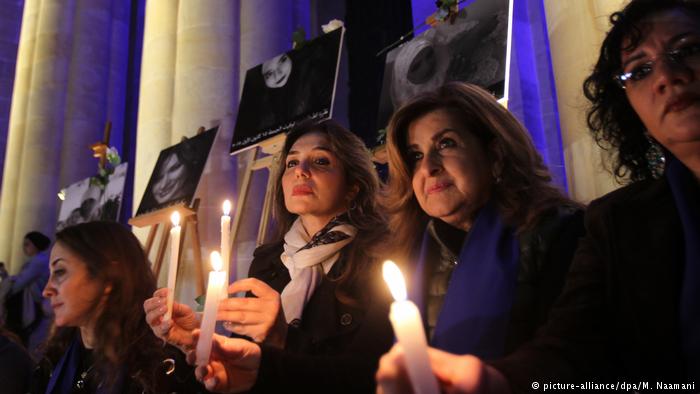
Dozens of people have gathered in Beirut to denounce violence against women after four murders in less than a week. One of them was a British embassy worker allegedly killed by an Uber driver.
A candle-lit vigil was held on Saturday by women’s rights activists outside Beirut’s national museum in protest at the murders of a British woman and three Arab women over the past seven days.
The campaigners demanded better laws to protect women, saying on Facebook ahead of the event that Lebanon lacked the “legal, social and political systems” to protect women against “systemic” violence, ranging from harassment to murder.
One of the organizers of the vigil, Leen Hasem, told the crowd: “Justice is not only arresting the criminal. Justice is for all this not to happen to us in the first place,” she said.
“Don’t tell me to cover up. Tell him not to rape me,” one woman chanted through a megaphone, a demand repeated by people in the crowd.
Dead women remembered
Participants laid white roses over pictures of the four women, and lined the steps with candles.
The murder that gained the most international media attention was that of British embassy worker Rebecca Dykes, who was found strangled beside a highway outside the Lebanese capital last weekend.
A Lebanese Uber driver picked up the 30-year-old before assaulting and killing her, state media said. A security official said the suspect had confessed to the murder.
Days before, a 22-year-old was found shot in the chest and her husband was detained. The investigation showed she sustained a broken chin, and had been hit on the head with a vase, as well as choked.
In the same week, a woman’s son-in-law was held in custody after she was found killed. His wife was also found wounded in their home, in the north of the country.
In another incident, a 15-year-old pregnant Syrian was found dead with a bullet in her neck, security sources said. Her husband has denied killing her.
Government under pressure
Lebanese politicians have come under fire for watering down a 2014 law which made domestic violence a criminal offence. Despite pressure, the legislation failed to criminalize marital rape. Child marriage remains legal.
Although parliament in August abolished a law that absolved rapists if they married their victims, activists say Lebanon has a long way to go to fully protect women.
A 2017 national study by the Beirut-based women’s rights group ABAAD said that one in four women have been raped. Less than a quarter of women who faced sexual assault reported it, the survey said.



